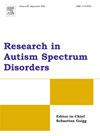Have information and communication technologies research for neurodevelopmental disorders improved overtime? A systematic meta-review
IF 2.2
4区 医学
Q1 EDUCATION, SPECIAL
引用次数: 0
Abstract
Background
The significant increase of Information Communication Technologies (ICTs) use for individuals with Neurodevelopmental Disorders (NDD) has created an urgent need to examine the implications of both the design and the research methodologies used to study them.
Methods
We searched four databases (PubMed, IEEXplore, Scopus, and ACM Digital Library) to find relevant reviews on clinical applications of ICTs with individuals with NDD. We extracted all studies (n = 1879) from 301 reviews, and classified them into categories: robots, serious games (SG), video modeling (VM), Augmentative and Alternative Communication (AAC). We randomly assessed 182 studies (45 per ICT category) stratified by years of publication using the Connolly methodology scale and design ICT inventory (DICTI). We also described the best papers per ICT (most cited or highest impact factor journals).
Results
Our assessments have indicated that the overall research methodology quality of ICT studies is poor. Serious Games (SG) studies have the best research methodology and ICT design quality scores. Studies on robots, Augmentative and Alternative Communication (AAC), and video modeling (VM) have shown improved research methodology over the years, though only SG design shown improvement consistently. Autism is the most prevalent NDD in terms of clinical focus in ICT therapeutic and educational interventions. Currently, no ICT has been approved as a prescription treatment in NDD, with the notable exception of EndeavorRx™, a SG for Attention Deficit Hyperactivity Disorder (ADHD). The literature also emphasizes that meeting the main research methodology criteria is essential for evidence-based medicine, Personalization, adaptability, positive feedback, human interaction and affordability are among the most important features to take into consideration in ICT design for NDD.
Conclusion
The review highlights the need for higher-quality studies, user-friendly technologies, personalization, positive feedback, and accessibility. ICTs are not detrimental to learning and demonstrate potential benefits for individuals with NDD. However, more evidence-based studies are needed to reach treatment prescription recommendation.
针对神经发育障碍的信息和通信技术研究是否随着时间的推移而有所改进?系统性荟萃回顾
背景信息通信技术(ICTs)在神经发育障碍(NDD)患者中的应用大幅增加,因此迫切需要研究这些技术的设计和研究方法的意义。方法我们检索了四个数据库(PubMed、IEEXplore、Scopus 和 ACM 数字图书馆),以查找有关信息通信技术在 NDD 患者中临床应用的相关综述。我们从 301 篇综述中提取了所有研究(n = 1879),并将其分为以下几类:机器人、严肃游戏 (SG)、视频建模 (VM)、辅助和替代性交流 (AAC)。我们使用康诺利方法量表和设计信息与通信技术清单(DICTI)对 182 项研究(每个信息与通信技术类别 45 项)进行了分层随机评估。我们还描述了每种信息和通信技术的最佳论文(被引用次数最多或影响因子最高的期刊)。结果我们的评估表明,信息和通信技术研究的总体研究方法质量不高。严肃游戏(SG)研究的研究方法和信息与传播技术设计质量得分最高。关于机器人、辅助和替代性交流(AAC)以及视频建模(VM)的研究在过去几年中显示出研究方法的改进,但只有 SG 设计显示出持续的改进。就信息和通信技术治疗和教育干预的临床重点而言,自闭症是最常见的 NDD。目前,除了用于治疗注意力缺陷多动障碍 (ADHD) 的 SG EndeavorRx™ 之外,还没有任何信息和通信技术被批准作为 NDD 的处方治疗方法。文献还强调,符合主要研究方法标准对循证医学至关重要,个性化、适应性、积极反馈、人际互动和可负担性是针对 NDD 的信息和通信技术设计应考虑的最重要特征。信息和通信技术不会对学习产生不利影响,并能为 NDD 患者带来潜在益处。然而,还需要进行更多循证研究,才能提出治疗处方建议。
本文章由计算机程序翻译,如有差异,请以英文原文为准。
求助全文
约1分钟内获得全文
求助全文
来源期刊

Research in Autism Spectrum Disorders
Multiple-
CiteScore
4.20
自引率
8.00%
发文量
108
期刊介绍:
Research in Autism Spectrum Disorders (RASD) publishes high quality empirical articles and reviews that contribute to a better understanding of Autism Spectrum Disorders (ASD) at all levels of description; genetic, neurobiological, cognitive, and behavioral. The primary focus of the journal is to bridge the gap between basic research at these levels, and the practical questions and difficulties that are faced by individuals with ASD and their families, as well as carers, educators and clinicians. In addition, the journal encourages submissions on topics that remain under-researched in the field. We know shamefully little about the causes and consequences of the significant language and general intellectual impairments that characterize half of all individuals with ASD. We know even less about the challenges that women with ASD face and less still about the needs of individuals with ASD as they grow older. Medical and psychological co-morbidities and the complications they bring with them for the diagnosis and treatment of ASD represents another area of relatively little research. At RASD we are committed to promoting high-quality and rigorous research on all of these issues, and we look forward to receiving many excellent submissions.
 求助内容:
求助内容: 应助结果提醒方式:
应助结果提醒方式:


